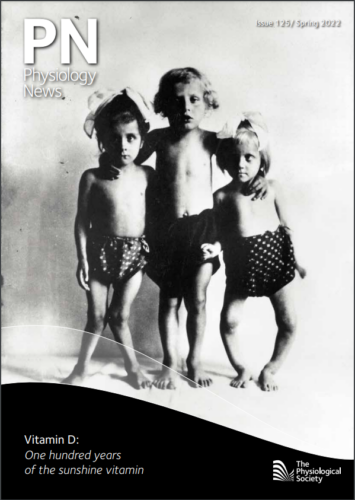
Physiology News Magazine
Editorial
Welcome to the first issue of Physiology News in 2022
News and Views
Editorial
Welcome to the first issue of Physiology News in 2022
News and Views
https://doi.org/10.36866/pn.25.5
Dr Keith Siew
To both our new and returning readers, welcome to the first issue of Physiology News for 2022. As we enter yet another tumultuous year on the rollercoaster that is the 2020s, I want to take this opportunity to write a little more candidly.
First, I want to publicly express my sincerest of thanks to my dear colleague and friend Julia Turan, who was the Managing Editor of Physiology News for my tenure thus far as Scientific Editor. It was a dream to work with you, and you brought so much positive change to Physiology News, which we will be forever grateful for and couldn’t have been done without you. Your passion for science communication and Diversity & Inclusivity issues were inspirational and will leave a lasting impression on all that we do going forward. I know I and the rest of the Editorial Board will very much miss you and we wish you every success in your future endeavours.
Since it has been a while since I’ve written an editorial myself, I want to send my belated thanks also to those who stepped down from the Editorial Board, Karen Doyle and Angus Brown, for their invaluable contributions over the past number of years. Also a big welcome to our new Editorial Board members Wendy Hempstock, who joins us all the way from the land of the rising sun, and Alex Carswell, who is a little closer to home, in beautiful Norwich. In this issue, Alex writes on the fascinating history of vitamin D and is joined by articles on the use of stems cells in tissue engineering for regenerative medicine, an immensely useful article on the pharmacology tools that may be useful to physiologists, and also an interesting look into the moment that the calcium theory of phototransduction fell from grace.
Later this year we also hope to be bringing you some exciting new content with special themed issues on sensory physiology to coincide with a joint meeting of The Physiological Society and Sainsbury Wellcome Centre taking place in London in June. As well as a dedicated issue on the role of physiological science in the response to climate change, which will coincide with the Europhysiology 2022 meeting held in Copenhagen in September.
Lastly, I am sending my heartfelt support to my Ukrainian friends and colleagues, as well as your family and peoples, during this unjust war of invasion being waged against your beautiful country by Putin. Like many, I am glued to the news coverage, horrified by what I see and hear. In particular, I was caught emotionally off guard by a Sky News reporter interviewing two young women in Kyiv, a biochemistry postgraduate student and a schoolteacher. The comforts and routine of daily life in the lab or classroom only a few days prior torn asunder as they were now compelled to enlist in civilian resistance forces, learning to shoot rifles and make petrol bombs to fight for freedom. I couldn’t help but put myself in their shoes, and think of my own students, and wonder whether we would have had the courage to do the same under similar circumstances.
I was extremely heartened to see that The Society has made a statement of solidarity and I want to also amplify the messages of support and draw attention to The Society’s Support and Inclusion fund, which can provide £1,000 to support those who need it, for instance with housing/living costs. I also am inspired by EMBO, which is providing a list of life scientists across Europe and beyond offering to host Ukrainian researchers in their labs, and also by #ScienceForUkraine where the scientific community is rallying to provide support for our Ukrainian colleagues impacted by the invasion. I urge all of you to check out these resources and lend your support if you have the means to do so!
I hope you, and all your families and friends, remain safe and well during these most uncertain of times.
